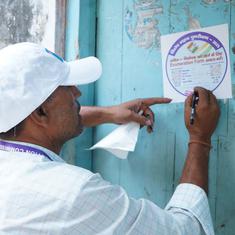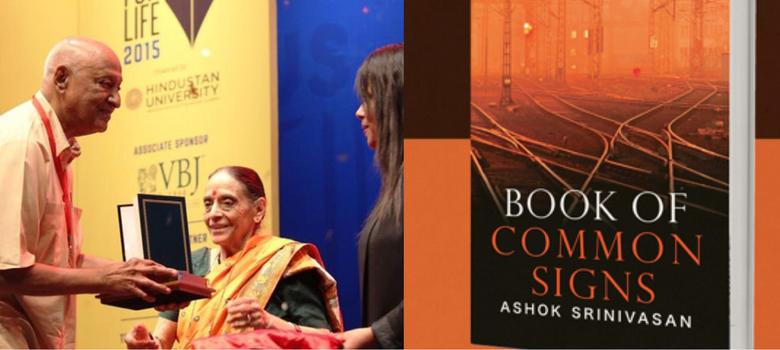Professionally, Bitia was a photographer.
She had sparkling eyes and raven black hair that came down to her knees. Her sloe eyes were pools of pain whose changing depths strangely hinted at the promise of happiness. One moment it was there, the next it was gone—it was not a quality that could be pinned down. There, in that city of cities, she was repeatedly abused. But every depravity heaped upon her only made her purer and more radiant. The more she was degraded, the more youthful she became; and even those who sought to defile her were made whole and clean.
Bitia looked around at the huddled figures bent over the dung fires in the terracotta landscape and the clotted forms in the shadows patiently waiting out the interminable night; the darkness was unequally scattered by the naphtha flares, the burning ghats where the funeral pyres were burning and the neon lights. There were long lines of the dead waiting to be burned. She studied the available light that was diffuse and irregular. Being a moonless night, the sky had no tonal quality at all. She stood still and closed her eyes, and the pain of the pulsing city seeped into her blood like toxin. Bitia took a room on the roof with an outside spiral staircase that led up to her balcony, which overlooked the potter’s colony. There, the red earth and dirty but holy water were combined to make the pots in which small quantities of the sacred Ganga water were transported to other less providentially blessed regions of the earth.
If you make your living from the dead, there is no place like Benaras.
More people go there to die than to live; to die there ensures an escape from the endless cycle of birth and rebirth. There was a great demand for Brahmin priests like Shastri who officiated at several cremations a day or Jara, the low-caste dom who prepared the dead bodies for the funeral pyres. They were just two of the numberless people transformed by their intimate contact with Bitia ‒ who cast no shadow, who left no footprints, who married Shastri but spent her nights with that untouchable, Jara, and other outcasts and rejects; she was there to save the lost and the hopeless.
Unlike the other priests, Shastri did not submit himself to fasting, flogging or fire-walking. When they first met, Shastri saw or thought he saw fleetingly a spirit of fierce independence in Bitia but what he said to her was that she had a face that was both sorrowful and sensitive. He could not get over the chromatic picture she made against the dusky window and she knew it. Shastri, much older than her, was a widower. But nothing in his temperament or training had prepared him for this encounter. It was a Sunday evening in winter.
‘So I look as sad as Sunday?’ she asked him with a smile, repeating what he had just said. The shadows in her eyes shifted and her face lit up. He was in thrall to the magic of her beauty as only a person who is hopelessly in love can be. He laughed in response and looked out of the window. It was not love nor the melancholy scene outside though, where the street lamps had just come on and were clashing against the failing light in the sky, but her lying words that felled him ‒ she told him that she was pregnant ‒ just like that, out of nowhere. Her words hung in the air, with nothing leading up to them or away from them. It was then that Shastri broke the silence and asked her if she would marry him and she agreed.
Jara was in his late teens when Bitia, nearly twice his age, first invited him to go with her to her room on the roof that she used as a studio-cum-darkroom.
It was a balmy summer night. Jara was minding the bodies burning on the Manikarnika Ghat. It was his duty to keep vigil and see to it that no one pinched the firewood or the pots in which the ashes were collected for immersion in the Ganga. It was his responsibility to prevent people from taking photographs. There were always visitors about wanting to capture these cremations on film ‒ hordes of camera-ready foreign tourists. Bitia was dying to show him her photographs, initiate him into the mystery of sex, and teach him photography. The night was full of the settled cacophony of devotional noises at cross-purposes with one another when Bitia’s whispered invitation to Jara rose from behind a stack of firewood, uncontaminated by the sepsis of sanctity all round, and set him on the road to manhood.
The half-light of the street lamps barely spilled into the room. Bitia hit Jara with her body like a palpable dream. She made love to him with the meticulous frenzy of the incorporeal. Later, she showed him stacks of photographs she had taken in Benaras; many of them were of funeral pyres and he featured, to his amusement, in several of them. He returned to his cadavers before dawn, his eyes jammed with after-images of Bitia, his whole being suffused with the perfume from her hair.
Bitia avoided sunlight as much as possible, saying the glare gave her a migraine.
She moved adroitly with an amazing economy of movement and grace from one patch of shade to another in the dappled sunlight without casting even a mottled shadow. It was very difficult to pin her down during the daytime; she was always somewhere else. And yet, people seemed to accept her as one of their own.
Whenever she could not be found, there was always talk of her being seen at the dhobi ghat where the washermen were beating the clothes; or she was outside the Ganesha shrine, rolling cotton wicks for the earthen oil lamps; others reported seeing her with a group of women singing hymns to that rutting, blue god, Krishna.
After she moved into Shastri’s house, Bitia got rid of all the mirrors. Once after the rains, Shastri called her out into the garden to look at a diesel oil rainbow in a puddle of water. She looked into the water with her face next to his but agitated the water with her fingers and rushed back into the house before he could notice the absence of her reflection in the water. It was just a reflex action on her part, because, by then, Shastri knew that she was a ghost ‒ the ghost he loved.
Bitia was besotted with Benaras. She taught Jara the rudiments of photography, using the minimum number of words. Generally, she was silent and hardly ever had a word for Jara. But whenever she was with Shastri, she talked endlessly ‒ often all night long, always about Benaras. Shastri could never have enough of her or her words. He adored her even though he was well aware that he had only a minuscule part of her with him; he knew only too well that she was ‒ even at that very moment ‒ elsewhere, intensely pursuing her several separate lives beyond his human reach.
Once he had asked her, ‘But why Benaras? Why this city crammed with beggars? What is it that grabs you about this city?’
‘This city, like me, never sleeps. What I see in Benaras is transfigured before my very eyes, and this, in turn, makes me more forgiving. That’s why I adore this merciful place.’
Over the years Jara took many photographs of Bitia but she never appeared in a single one of them. She was neither a silhouette nor a blank cutout ‒ very simply, there was no outline. Her absence in the photographic record was total, complete.
Bitia, of course, was never in just one place at any given time. When she was making love to Jara, she was at the same time in, say, the leper colony, hugging a flyblown man swaddled in bandages.
She was also in the bedroom with Shastri, filling him in on the details of his native city. ‘I was getting the strap of my sandal fixed,’ she said. ‘The cobbler was lecturing a foreigner on the subtle complexities of Benaras: Benaras is nothing but maya, an illusion; others maintain that it is a construct of smoke, mirrors and fortuitous lighting; and still others are of the opinion that it is composed of memories, dreams, hopes and fears. But the tourist paid no attention to his babble; he was pointing to a dishevelled bird riding on a charred corpse floating down the holy Ganga . . .’
Without a pause she added, ‘A new deity complete with smouldering joss sticks has taken up residence between the wrestlers’ arena and the dyers’ vats . . .’ and so they went on, her reports on Benaras.
While she was on a non-stop talking binge with Shastri, she was whipping Jara with her knee-length, silken hair and simultaneously visiting the twisting alleys of the red-light district that came alive only after dark. She gave herself to several people who needed her most, at the same time.
One night, after an unseasonal downpour, a cold wind blew in from upriver.
And when that happened, Benaras acquired its characteristic smell of truffles and sex.
Bitia, who was intent on avoiding a lurching cripple from bumping into her, was grabbed by a dope addict who darted out of the shadows and threw her under a paan-stained, granite staircase into a cobwebbed, mossy corner on some sopping gunnysacks; it was a case of drug overdose.
He grabbed her in his wasted arms and threatened to cut her up if she tried to get away. She calmed him down and convinced him to put away his cut-throat razor. He kept repeating the word thirsty like a charm or a prayer. She gathered him in her arms and guided his grinning rictus to her bare breast. He was dying. She was lactating.
Bitia, full of grace, cradled his twisted form in her arms long after his body had turned cold.
She stayed with him like that until daybreak. One starry winter night, when Bitia was headed towards the hospice for child prostitutes, a deranged hawker of forest-produce lured her down some disused steps, to the shrine of a homemade god next to a septic tank on a sewage landfill.
He was so emotionally tortured that she let him lead her away. The place gave off an awful stench. After forcing himself on her, he attempted to ritually sacrifice her by beheading her with his axe but botched it and hung himself with a length of hemp from a dead tree before she could save him.
Leading the nightlife that led her, it was not at all uncommon for Bitia to be beaten, drugged, raped and sodomised by some of the very people whom she succoured. But she bore no scars from these incidents. The more she was battered, the more inviolate she became.
As the years went by she steadily grew younger and more beautiful till she was incandescent as a feverish saint.
Already there was some loose talk among the pious in the freemason’s lodge of the imminence of a second coming or a new avatar. Bitia the ghost passed into the folklore and bazaar gossip of that timeless city of death and desire.
The night was coming to an end. It was a night like any other. Bitia was severally returning home from her bouts of passion and compassion from various parts of the city that never went to sleep. Smoky figures stirred in the last dark of early morning as the first streaks of adamantine light appeared in the eastern sky, when Bitia turned her back on Benaras and disappeared forever, much as she had appeared out of nowhere. The aura she left behind formed the core around which grew the cult of Bitia Devi, the latest in a series of mother goddesses in the subcontinent.
Excerpted with permission from Book of Common Signs, Ashok Srinivasan, Harper-Collins India.










